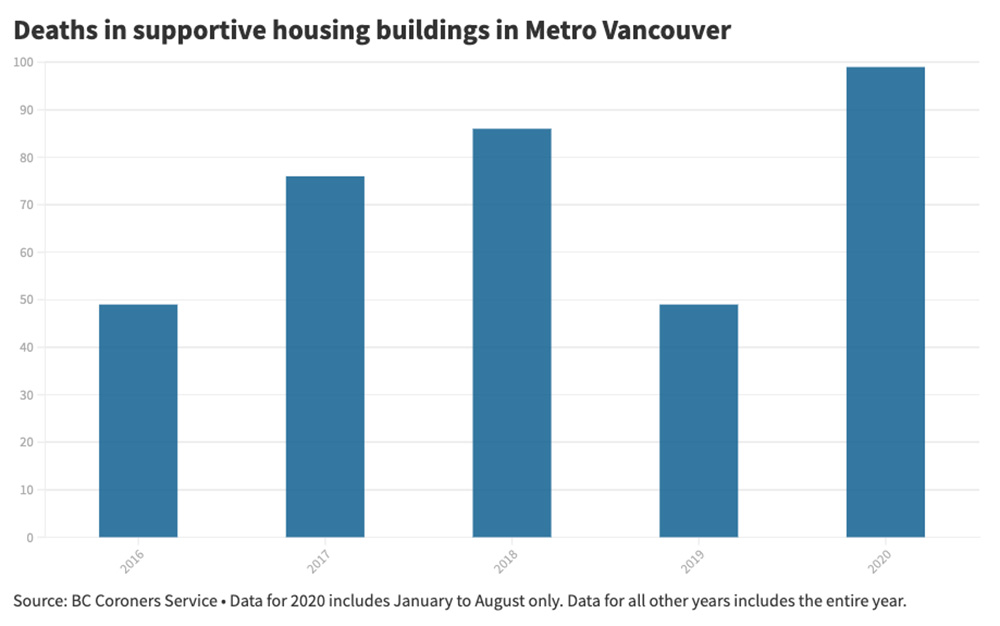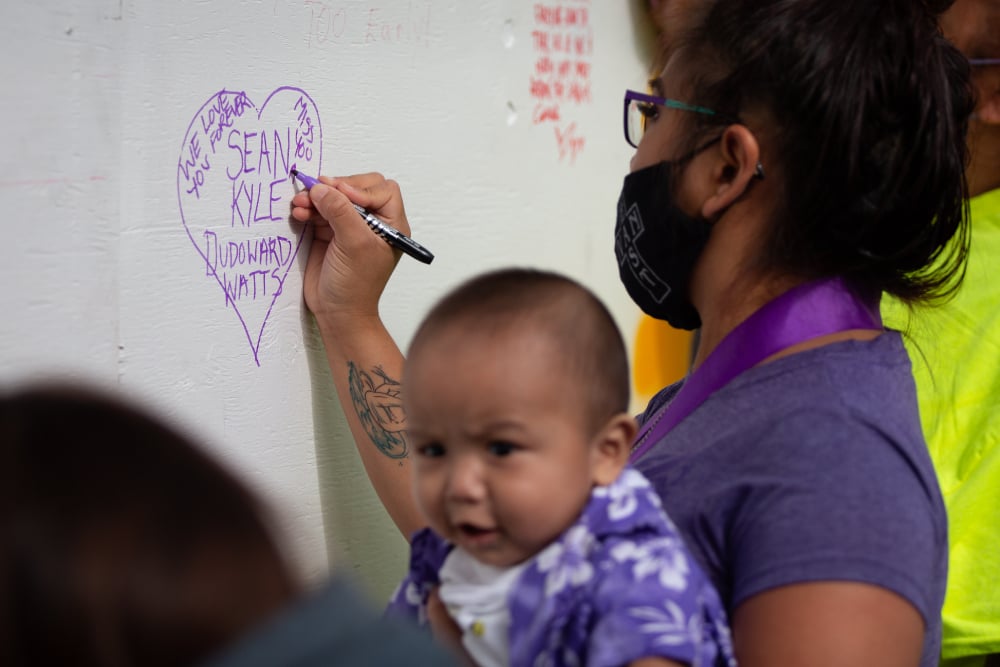Residents and workers in supportive housing are mourning an unusually high number of residents who died in 2020 from overdoses, age-related causes and a small number of deaths from COVID-19 complications.
“It’s been a really rough year, as you see in the numbers,” said Tanya Fader, director of housing for PHS Community Services.
“It’s been really, really emotionally hard for our staff and definitely for the residents left behind.”
Data from the BC Coroners Service shows deaths in supportive housing buildings from January to August were double the number seen in all of 2019. In 2019, 49 people died in buildings operated by Atira, PHS Community Services, Lookout and RainCity. In the first seven months of 2020, 99 residents and guests died in the buildings.
The numbers are from buildings operated by the four major non-profit housing providers and don’t include every supportive housing building in Metro Vancouver. Due to the length of time it takes to process freedom of information requests, The Tyee was only able to obtain data for the first seven months of 2020. The data includes deaths that happened at the buildings, not in hospitals or other locations.
The numbers mirror the rise in deaths from overdoses this year: in 2019, an average of 81 people died every month from poisoned drugs. In 2020, an average of 140 people have died every month.*
With borders closed to prevent the spread of COVID-19, illicit drugs have become even more poisoned, often with extreme concentrations of fentanyl, a powerful synthetic opioid.
Most of the supportive housing buildings run by the four non-profits are in the Downtown Eastside, a neighbourhood that’s been hit especially hard by the overdose crisis. Janice Abbott, CEO of Atira, said 18 people — nine residents and nine guests in Atira-run buildings — have died of overdoses this year.
Housing providers came under fire earlier this year when they banned visitors to their buildings during the early months of the pandemic. Vancouver Coastal Health warned the practice could be contributing to the increase in overdose deaths, and some tenants have said they believe the visitor ban contributed to deaths of loved ones.
Both Atira and PHS have denied that the visitor bans, which have now been relaxed, contributed to overdose deaths.
RainCity Housing and Lookout declined to be interviewed for this story.
Fader said the high number of deaths this year is not just a result of the overdose crisis. Tenants who have lived in PHS buildings for decades are now aging and dying from illnesses like cancer, heart attacks or complications after a fall.
Most of the 11 deaths at the Portland Hotel in 2020 fell into that category. Residents are coming to the end of their lives after experiencing years of trauma, homelessness, substance use or chronic illnesses. But many of them aren’t accepted at long-term care homes because they smoke, use drugs or have other issues, Fader said.

“If residents indicate that they want to die at home, we do everything we can to make them as comfortable as possible and make that happen,” she said.
A few of the deaths this year have been from COVID-19 or complications from the virus. Three Atira residents and one PHS resident died after getting COVID, according to Abbott and Fader. COVID-19 cases started to rise in the Downtown Eastside this fall. Vancouver Coastal Health says the numbers for Downtown Eastside residents and workers has now declined and are “holding steady.”
B.C. provincial health officer Dr. Bonnie Henry has said that people who live in the Downtown Eastside who come down with COVID-19 are much more likely to need to be hospitalized than people in other neighbourhoods.
PHS, Atira and other supportive housing agencies have added safe consumption rooms to their buildings. But Abbott said harm reduction can now only go so far to prevent deaths given the more toxic drug supply.
“I absolutely support overdose prevention sites and shared using rooms. We need them desperately, but we have to stop pretending that they’re going to solve the problem,” Abbott said. “People die when they’re alone. They die when they’re with others.”
The province did promise to expand safe supply programs in response to the soaring overdose death rate. Safe supply is when prescription drugs are prescribed to people to replace the tainted illicit supply.
But Abbott said it’s still too difficult to get people quickly connected with safe supply.
She said she’d like to see governments respond to the overdose crisis with the same urgency shown in their COVID-19 response.
“We need to make it accessible,” Abbott said. “People shouldn’t have to jump through hoops or answer questionnaires about whether they’d rather go to treatment. If the goal is to actually keep people alive, you can worry about that stuff later.”
Fader echoed that call and added that decriminalization could also make a difference. In November, Vancouver’s city council voted to ask the federal government to decriminalize the possession of drugs for personal use.
People who live in the Downtown Eastside have lost many neighbours, friends and family members this year, and COVID-19 restrictions have made it difficult for people to grieve those losses, Fader said. Instead of holding memorial services, PHS has set up memorial tables with candles, flowers and photographs that residents can visit one by one. Sometimes as many as four tables have been set up in a building at one time.
“We're dealing already with community members who have very traumatic backgrounds,” Fader said. “I worry about the impact of the pandemic times, compounded onto that trauma, for both staff and residents.”
* Story updated on Dec. 21 at 11:08 a.m. to correct the average number of deaths per month. ![]()
Read more: Coronavirus, Housing
















Tyee Commenting Guidelines
Comments that violate guidelines risk being deleted, and violations may result in a temporary or permanent user ban. Maintain the spirit of good conversation to stay in the discussion.
*Please note The Tyee is not a forum for spreading misinformation about COVID-19, denying its existence or minimizing its risk to public health.
Do:
Do not: